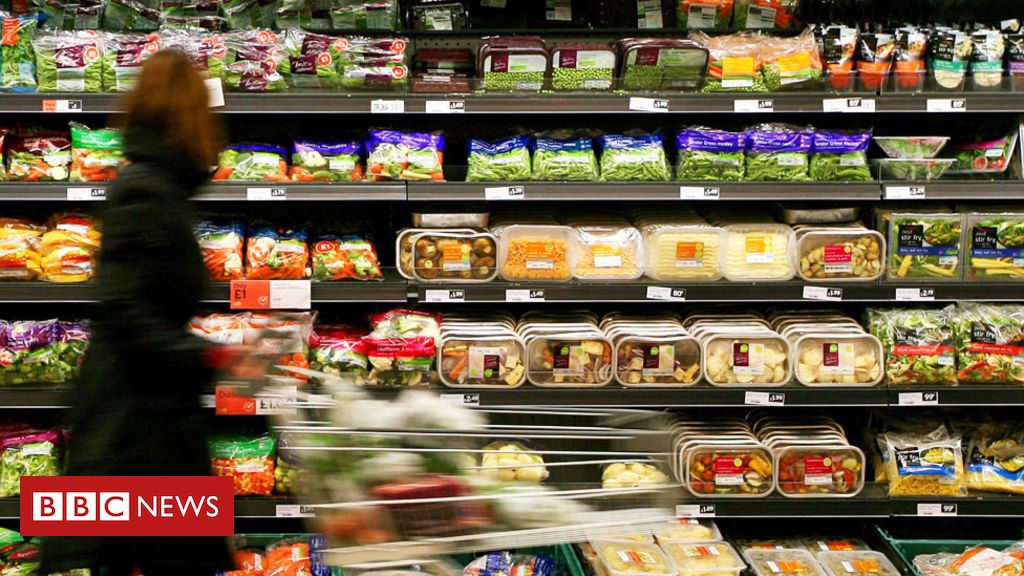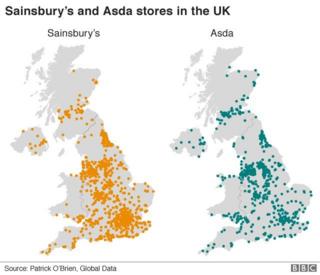
Sainsbury’s-Asda merger in jeopardy
 Image copyright Alamy
Image copyright Alamy Customers could see higher prices and less choice as a result of the proposed merger between Sainsbury’s and Asda, the UK’s competition watchdog has said.
The Competition and Markets Authority (CMA) said it could block the deal or force the sale of a large number of stores or even one of the brand names.
However, it also said it was “likely to be difficult” for the chains to “address the concerns”.
Sainsbury’s boss told the BBC the findings were “outrageous”.
In its provisional report on the proposed merger, the CMA also said the merger could lead to a “poorer shopping experience”.
Stuart McIntosh, chair of the CMA’s independent inquiry group, said it had found “very significant competition concerns in a number of areas – they are to do with grocery shopping in supermarkets, grocery shopping online and the companies’ petrol stations”.
“However, if one recognises that the competition concerns are quite broadly based… putting together a package of measures which addresses those concerns is likely to be complex and quite challenging,” he said.
- Asda sales slow amid ‘challenging’ trade
- Supermarket mega-merger faces crunch decision
- Sainsbury’s-Asda deal in nine charts
- Business Live: Sainsbury’s-Asda reaction
But Sainsbury’s chief executive Mike Coupe described the CMA’s analysis as “fundamentally flawed” and said the firm would be making “very strong representations” to it about its “inaccuracy and lack of objectivity”.
“They have fundamentally moved the goalposts, changed the shape of the ball and chosen a different playing field,” he told the BBC.
“This is totally outrageous.”
Sainsbury’s shares were down more than 12% in early Wednesday trading.
Analysis: Sainsbury’s plans crushed
Dominic O’Connell, Today business presenter
Supermarket bosses know that British competition regulators have always had a strong interest in the grocery market. There has been a string of inquiries over the last two decades, both into individual deals and the bigger question of how well the market serves consumer interests.
So Sainsbury’s board members would have been nervous when they proposed a takeover of Asda last year – but they did at least have the encouragement that the Competition and Markets Authority (CMA) had approved a tie-up between Tesco and Booker just a few months earlier.
Unfortunately for them, the light at the end of the tunnel turned out to be an oncoming train.
The regulator has crushed Sainsbury’s plans. There is no veto, but the strong language used, and the breadth of the problems found, suggest there is no way back.
The firms will have a chance to respond to the CMA’s provisional findings, before it publishes its final decision on 30 April.
The watchdog said it had identified two potential remedies to the loss of competition: either blocking the merger entirely or forcing the sale of “assets and operations”, including stores or even the Sainsbury’s or Asda brands.
However, it added that it “currently considers that there is a significant risk that a divestiture will not be effective in this particular case”.
The two chains would need to sell “sufficient assets and operations to enable any purchaser to compete effectively as a national in-store grocery retailer”.
It added that it may not be possible to achieve an effective solution to the loss of competition “without also divesting one or other of the Asda or Sainsbury’s brands, in addition to physical assets and operations”.

‘Lower prices’
The deal would create the UK’s biggest supermarket chain, a business accounting for £1 in every £3 spent on groceries, with a 31.4% market share and 2,800 stores.
The CMA’s Mr McIntosh said: “We have provisionally found that, should the two merge, shoppers could face higher prices, reduced quality and choice, and a poorer overall shopping experience across the UK.
“We also have concerns that prices could rise at a large number of their petrol stations.”
However, in a joint statement, Sainsbury’s and Asda said combining the two chains would create “significant cost savings, which would allow us to lower prices”.
“Despite the savings being independently reviewed by two separate industry specialists, the CMA has chosen to discount them as benefits.”
